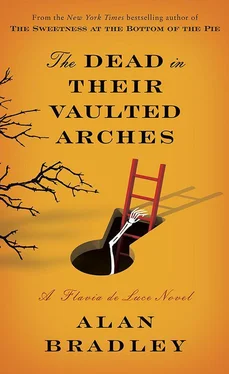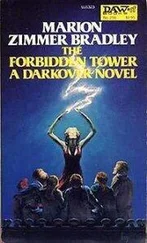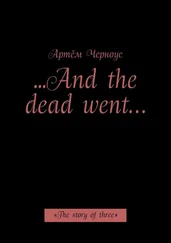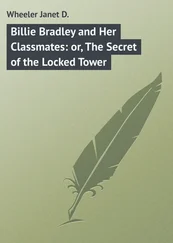“Do you?” she asked. And then after an immensely long time she added, “I’m glad.”
She certainly didn’t look glad.
In ordinary circumstances, although I never tell her so, my sister Feely is strikingly beautiful. Her hair shines with a golden glow and her blue eyes sparkle vividly. Her complexion—at least since its volcanic activity settled down—was turning out to be what the cinema magazines called “English peaches-and-cream.”
But now, with Feely hunched miserably before me at the keyboard, I had a brief glimpse of what she was going to look like when she was an old woman, and it was not a pleasant picture. In fact, it was frightening.
Worse, I felt an overwhelming wave of pity.
I longed to tell her how desperately I had tried to bring Harriet back from the dead so that we all of us, she and Father and Daffy and I, and not forgetting Dogger and Mrs. Mullet, of course, should live happily ever after.
It was, in a way, like Dr. Kissing’s story: half truth, half fairy tale. But which half was which?
I no longer knew.
Was this nightmare pulling me towards reality or fantasy?
“Is there anything I can do?” I asked, fighting the undertow of my tired mind.
I realized how little sleep I’d had and how powerfully it was affecting me.
“Yes,” Feely said. “There is. Don’t do anything this afternoon to embarrass us.”
As if I were a tramp at the kitchen door.
I think it was the “us” that hurt the most. Just one more of those little words with long shadows: two plain little letters, u and s , that transformed me from a sister into an outsider.
“Has Aunt Felicity had her talk with you yet?” Her voice suddenly as cold and stiff as whipped egg whites.
“Talk? What talk?”
Feely turned back to the keyboard and her hands crashed down in the most harsh, the most grinding, the most tortured series of chords imaginable.
I clapped my hands to my ears and fled the room.
I raced along the hall and across the echoing foyer—hang the gaping mourners!—up the staircase and into the east wing.
I flung open the door of my laboratory, dashed inside, slammed the door behind me, and pressed my back against it.
A tall man turned round, and in his raised hand was the test tube which he had been examining.
It was Sir Peregrine Darwin.
TWENTY-FIVE
“I BELIEVE THIS IS cyanide,” he said, and not at all pleasantly.
I nodded. I could hardly deny it—particularly to a man whose specialty it was to professionally identify cyanide.
“The laboratory belonged to my great-uncle, Tarquin de Luce. Perhaps you’ve heard of him?”
I was taking a risk, I knew, but it was at the moment the best I could come up with. Perhaps Sir Peregrine, I thought, had been at Oxford with Uncle Tarquin—but no, he wasn’t old enough. But surely he must have heard of my uncle’s work—perhaps he’d even idolized him as a boy.
Blood among chemists runs thick—at least I hoped it did.
But it was no use. Sir Peregrine didn’t rise to the bait. He replaced the cyanide in its rack with a careful precision that I had to admire.
This man knew what he was doing.
“Your mother’s inner coffin was cut open with a pair of ten-inch tinman’s snips,” he said accusingly.
I tried to look incredulous.
“Yes, you left the tools of your trade behind. We’ve sent them up to London for analysis and have just received back the report that your fingerprints—and your fingerprints alone—are all over them. Explain.”
Well! Had my fingerprints on file, did they? I must admit I was flattered. The Hinley Constabulary must have handed them over from one of my earlier investigations.
Still, I had to give the man credit. He certainly didn’t believe in letting the grass grow under his feet. If he had the ability to whisk a piece of evidence up to London, and have it analyzed and brought back to Bishop’s Lacey within hours, the man was clearly no slouch. Inspector Hewitt would be chartreuse with envy. I could hardly wait to tell him.
“Well?”
He was waiting, and the look on his face could only be described as grim. “In case you are not aware of it, Miss de Luce, interference with the burial of a dead body is not—”
“I didn’t interfere with her,” I interrupted, the blood rushing to my face. “I didn’t touch her!”
“Then what, pray, may I ask, were you doing?”
“She was my mother,” I said. “I’d never seen her face. I wanted to—before she was buried.”
I tried to stare him down but my lower lip was trembling.
Sir Peregrine did not look away.
Slowly he began to walk towards me, seeming to grow taller with every step until he was hovering over me like a bird of prey.
I found myself shrinking away from him—cringing.
“Peregrine!” The voice cut through the air like a thrown knife.
I spun round. “Aunt Felicity!”
“Felicity!” said Sir Peregrine.
“What are you doing to that child?”
I could have cheered—even if she had committed the unforgivable sin.
“Well, Peregrine? Explain yourself.”
“I was merely doing that which I am required to do by His Majesty’s Government.”
“Poppycock. You were trying to intimidate the girl. You ought to be ashamed of yourself.”
“Felicity—”
Sir Peregrine was gaping as if he had been set upon by the Furies, those avenging goddesses of the underworld with their black robes, bloodshot eyes, and snaky hair, whose happy job it is to punish evildoers.
“Come along, Flavia,” Aunt Felicity said, almost dislocating my arm as she seized me by the elbow and marched me out of the room. “It’s time we had a talk.”
We were halfway down the staircase before she let go of me.
“Quickly,” she said, hustling me through the kitchen, holding open the door, and urging me through.
“Where are we going?”
“You’ll see,” she said.
I hate people who say that.
Halfway across the Visto, I was still trying to catch up. For an elderly lady, I realized, Aunt Felicity was remarkably fit.
Blithe Spirit was still parked as I had last seen her, but Tristram Tallis was nowhere in sight. Nor, for that matter, was Adam Sowerby.
“Get in,” Aunt Felicity ordered, pointing.
I clambered up onto the wing and dropped into the front cockpit. Aunt Felicity, without further ado, went round the nose of the craft and gave the propeller a couple of remarkably powerful pulls.
“Switch on!” she shouted.
I looked at the instrument panel and could see only one switch. It was marked “Magneto” and I twisted it to the right.
“Switch on!” I called back.
I had seen this done in the cinema but had never actually had the opportunity to do it myself.
Aunt Felicity gave the prop another sharp spin, and as it had done this morning, it vanished with a roar.
Whatever Tristram had done with the faulty sparking plug must have cured the problem. The engine was running with a silky, self-satisfied rumble, popping a bit with joy as if it could hardly wait to get off the ground and into the air.
Now Aunt Felicity was lowering herself into the rear cockpit and the stick and pedals in front of me began to wigwag of their own accord.
The throttle shot forward in its metal quadrant, and we began to move.
The Visto became a blur. Buckshaw rotated slowly in the near distance as if it were on a turntable and we were standing still.
And then the ground dropped, and for the second time in my life I was flying.
Blithe Spirit pitched and bucked as the stick in front of me shook in its socket.
Aunt Felicity was trying to get my attention.
Читать дальше












